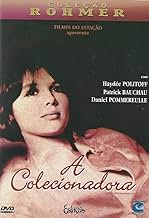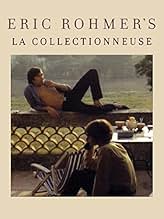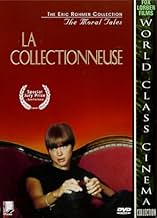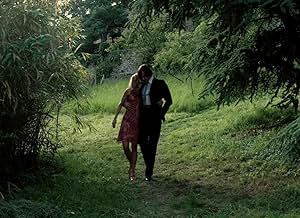La collectionneuse
- 1967
- Tous publics
- 1h 26m
IMDb RATING
7.3/10
11K
YOUR RATING
A womanizing art dealer and a painter find the serenity of their Riviera vacation disturbed by a third guest, a vivacious bohemian woman known for her long list of male conquests.A womanizing art dealer and a painter find the serenity of their Riviera vacation disturbed by a third guest, a vivacious bohemian woman known for her long list of male conquests.A womanizing art dealer and a painter find the serenity of their Riviera vacation disturbed by a third guest, a vivacious bohemian woman known for her long list of male conquests.
- Awards
- 2 wins & 1 nomination total
Mijanou Bardot
- Carole
- (as Mijanou)
Eugene Archer
- Sam
- (uncredited)
Brian Belshaw
- Haydée's boyfriend
- (uncredited)
Pierre-Richard Bré
- Homme dans l'auto
- (uncredited)
Donald Cammell
- Garçon à St-Tropez
- (uncredited)
Alfred de Graff
- Touriste perdu
- (uncredited)
Featured reviews
In The Collector, the first feature-length film of the Six Moral Tales series, mind-games, strategies, and overt manipulation thwart the possibility of satisfying relationships. The 54-minute film is beautifully photographed and has an elegance, charm, and wit that bears favorable comparison with his more acclaimed works. Adrien (Patrick Bauchau), an art dealer, and Daniel (Daniel Pommereulle), a painter spend the summer in a house on the French Riviera. Also vacationing there is Haydee (Haydee Politoff), an elegant but rather aloof young woman who sleeps with many boys in the area and has earned the title of "collectionneuse", a collector of men. Adrien, smug and self-centered in a charming sort of way, is interested in Haydee but tells himself that her promiscuity is a trick for him to seduce her and he refuses.
The summer turns into a love triangle with Adrien convincing Daniel to pursue Haydee to ease the pressure of his own conflict between his rationalizing intellect and his passions. In the moral scheme of things, Haydee may represent the sexual revolution of the 60s and Adrien that of traditional morality, yet the film takes no sides, presenting the issues without judging the characters and giving us much to think about. The Collector is perhaps the most philosophical of the six but in the end the pursuit without passion leads to a feeling of emptiness and missed opportunities. Like most of Rohmer's films, there are no peak dramatic moments or confrontations, just everyday life elevated into art.
The summer turns into a love triangle with Adrien convincing Daniel to pursue Haydee to ease the pressure of his own conflict between his rationalizing intellect and his passions. In the moral scheme of things, Haydee may represent the sexual revolution of the 60s and Adrien that of traditional morality, yet the film takes no sides, presenting the issues without judging the characters and giving us much to think about. The Collector is perhaps the most philosophical of the six but in the end the pursuit without passion leads to a feeling of emptiness and missed opportunities. Like most of Rohmer's films, there are no peak dramatic moments or confrontations, just everyday life elevated into art.
A young man (Patrick Bauchau) parts with his fiancée to vacation in the south of France, where he plans to catch up with an old friend and spend his time in solitude. His holiday idyll is perturbed by the presence of a young woman (Haydée Politoff), who he says is not his type, but spends an awful lot of his time thinking about. She's sexually free and while in search of what she's looking for in life, sleeps with various men, a fact that gets under his skin.
The film is appealing aesthetically because through various small observational details in the surroundings and in the introspective silences he allows in, Éric Rohmer transports us to this place and its feeling. Politoff is also appealing to say the least, and her character has such an innocent simplicity about her that she's charming to watch. These are the things that made the film for me.
What I disliked about it was the protagonist, who provides the narration and the point of view of the film. While Rohmer is making a point about male insecurity and this guy's issues (as well as the other guy there, who's also an idiot), I have to say, he's so cold and judgmental that he's not likeable. I would have loved a version of this film that was made from Haydée's perspective. To its credit, through dialogue she is allowed to express her opinions, e.g. That he should mind his own business, and her boredom as he prattles on with his tedious pseudo-intellectualism. The art dealer also provides quite a takedown of the young man's not working and general laziness. He seems empty as a person and I suppose we're meant to recognize that and compare it to Haydée, who presumably goes off to Italy at the end and gets more enjoyment out of life. It's just unfortunate that the film, through its title and its narration, seems to share some of the viewpoint of the young man.
Overall, however, I liked this film both times I've watched it, and thought it was wisely kept at just 83 minutes. It makes me feel as though I was on holiday, and the images of Haydée Politoff are indelible.
The film is appealing aesthetically because through various small observational details in the surroundings and in the introspective silences he allows in, Éric Rohmer transports us to this place and its feeling. Politoff is also appealing to say the least, and her character has such an innocent simplicity about her that she's charming to watch. These are the things that made the film for me.
What I disliked about it was the protagonist, who provides the narration and the point of view of the film. While Rohmer is making a point about male insecurity and this guy's issues (as well as the other guy there, who's also an idiot), I have to say, he's so cold and judgmental that he's not likeable. I would have loved a version of this film that was made from Haydée's perspective. To its credit, through dialogue she is allowed to express her opinions, e.g. That he should mind his own business, and her boredom as he prattles on with his tedious pseudo-intellectualism. The art dealer also provides quite a takedown of the young man's not working and general laziness. He seems empty as a person and I suppose we're meant to recognize that and compare it to Haydée, who presumably goes off to Italy at the end and gets more enjoyment out of life. It's just unfortunate that the film, through its title and its narration, seems to share some of the viewpoint of the young man.
Overall, however, I liked this film both times I've watched it, and thought it was wisely kept at just 83 minutes. It makes me feel as though I was on holiday, and the images of Haydée Politoff are indelible.
"La Collectionneuse", the third film in Eric Rohmer's six moral tales, is packed with lacerating observations on life, love, and the nature of man. It is a sensitive conversation piece with elegant people commenting poetically on their lives and of those around them. Attractive men and women who reflect openly about the conflicts of intellect and impulse; inclination and action, solitude and companionship. Rohmer characteristically paces this eloquent tale of sexual temptation with long, fluid takes. "La Collectionneuse(Collector Girl) centers around a young, hedonistic girl(Haydee) who saunters laconically around the provincial environs of a large vacation home, seemingly indifferent to the two older men's(Adrian and Danele) existence. Haydee exudes a casual independence and an unflappable reserve. Her cursory dealings with her young lovers prompts Danele to cast her as 'the atrocious ingenue'. Though they find her unexpectedly alluring, both men regard 'the idea of collecting boyfriends opposite of purity'. Rohmer, the director of "Chloe in the Afternoon" and "A Tale of Springtime", enjoys revealing which individual can best cast their charm and guile to their best advantage. This 'game' between the sexes only leads to unwanted desires for the men and a resumption of her search by Haydee. Rohmer handles the material with a light touch throughout and concludes his story by offering a tenuous solution to the prevailing tension in the movie between one's solitude and fraternity. Adrian privately confesses that 'I was overwhelmed by a feeling of delightful independence, of total self-determination. But in the emptiness and silence of the house, I was overcome with anguish'. A universal truth clearly-rendered by one of cinema's most ingenious and graceful filmmakers.
La Collectionneuse is a fine example how consistent Eric Rohmer was throughout his Moral Tales series. The story isn't important here, its the intensity of each scene and the tension among the characters till the last scene. Subtle jump cuts in the storyline can make you pause & arrive at your own hypotheses about how the characters are feeling in the following scenes. This is a visual treat - whether its the sights & sounds of the reviera house where most of the movie takes place, or the shots of beach or Haydee Politoff's delicious lips. You never begin to hate or love any character at any point - but they stay on your mind long after the movie is over. The characters, adrian, haydee & daniel exude human rawness - none are perfect or simplistic. As a viewer, I could not take anyone's side. They all seek power in their own ways, while exposing their sensitivies equally. Its a curious caricature of the complexities around love and life. Rohmer uses symbols like antiques to express how the relationships are built and broken. I could watch it again & again. A delightful Rohmer classic - its poetic, with a pacing that works as a meditation of sorts.
Two tired cliches are that sex destroys friendships and that men and women can never really be friends and no-one chronicled these two sayings better than Eric Rohmer who made it his life's work to explore the psychological battles that we call courtship. In doing so he became, perhaps, the cinema's greatest director of women. Let's forget for a moment that he divided his films into series, (Six Moral Tales, for example, of which "La Collectionneuse" is one), and concentrate on the film at hand.
"La Collectionneuse" is very simple and very straightforward. Two male friends spend a summer sharing a villa in the south of France. There is another occupant, a slightly younger woman who sleeps around and it is she the men christen the collector since she 'collects' men wherever she goes. They, of course, consider themselves moral but they are also intellectuals and perhaps womanisers, too. They want to collect the girl; they want the girl to collect them.
Like all of Rohmer's best work this is a film of talk rather than action. Rohmer doesn't film love scenes or sex scenes; once his male and female characters enter the bedroom he loses interest. It's the chase and not the catch he cares about and whether men and women really can be friends as well as lovers. He takes his subjects seriously but he also likes to have fun at their expense and like so many of his films "La Collectionneuse" will have you chuckling if not exactly laughing out loud.
In his later films it was usually the women who took the lead but here it is Adrien, (a superb Patrick Bauchau), who acts as our narrator, guiding us through the moral maze but then all three players are excellent. This may be a minor Rohmer film but minor only in the way a short story is considered minor when compared to a novel. Personally I think "La Collectionneuse" is a Rohmer crying out for your collection.
"La Collectionneuse" is very simple and very straightforward. Two male friends spend a summer sharing a villa in the south of France. There is another occupant, a slightly younger woman who sleeps around and it is she the men christen the collector since she 'collects' men wherever she goes. They, of course, consider themselves moral but they are also intellectuals and perhaps womanisers, too. They want to collect the girl; they want the girl to collect them.
Like all of Rohmer's best work this is a film of talk rather than action. Rohmer doesn't film love scenes or sex scenes; once his male and female characters enter the bedroom he loses interest. It's the chase and not the catch he cares about and whether men and women really can be friends as well as lovers. He takes his subjects seriously but he also likes to have fun at their expense and like so many of his films "La Collectionneuse" will have you chuckling if not exactly laughing out loud.
In his later films it was usually the women who took the lead but here it is Adrien, (a superb Patrick Bauchau), who acts as our narrator, guiding us through the moral maze but then all three players are excellent. This may be a minor Rohmer film but minor only in the way a short story is considered minor when compared to a novel. Personally I think "La Collectionneuse" is a Rohmer crying out for your collection.
Did you know
- TriviaÉric Rohmer's first color film.
- ConnectionsFeatured in Uuden aallon jäljillä (2009)
Details
- Release date
- Country of origin
- Official site
- Languages
- Also known as
- Six contes moraux IV: La Collectionneuse
- Filming locations
- Côte d'Azur, France(coastal line and landscapes)
- Production companies
- See more company credits at IMDbPro
Box office
- Gross worldwide
- $7,077
- Runtime
- 1h 26m(86 min)
- Sound mix
- Aspect ratio
- 1.37 : 1
Contribute to this page
Suggest an edit or add missing content

![Watch Bande-annonce [OV]](https://m.media-amazon.com/images/M/MV5BMjA2ZGRjY2QtNmMzMy00MjE3LWI1YzUtZTZiZDQ5YzY0YWIxXkEyXkFqcGdeQXRyYW5zY29kZS13b3JrZmxvdw@@._V1_QL75_UX500_CR0)

























